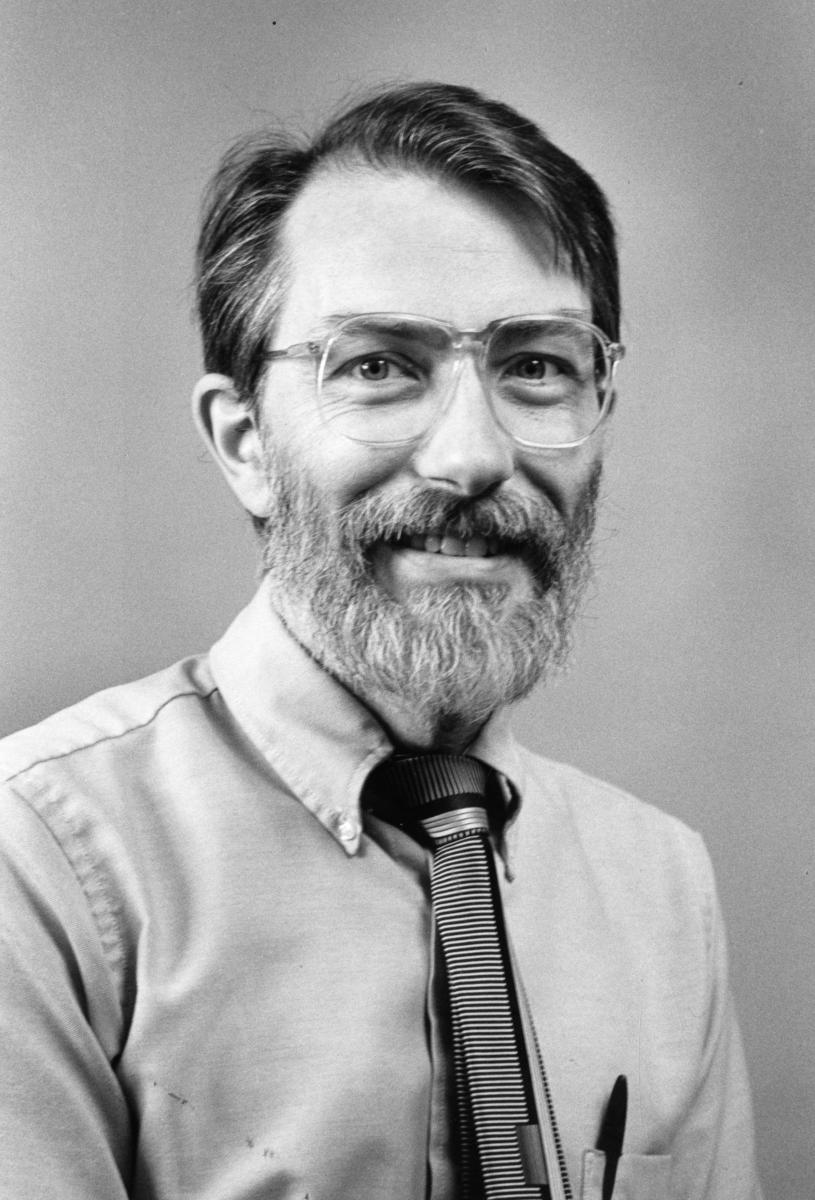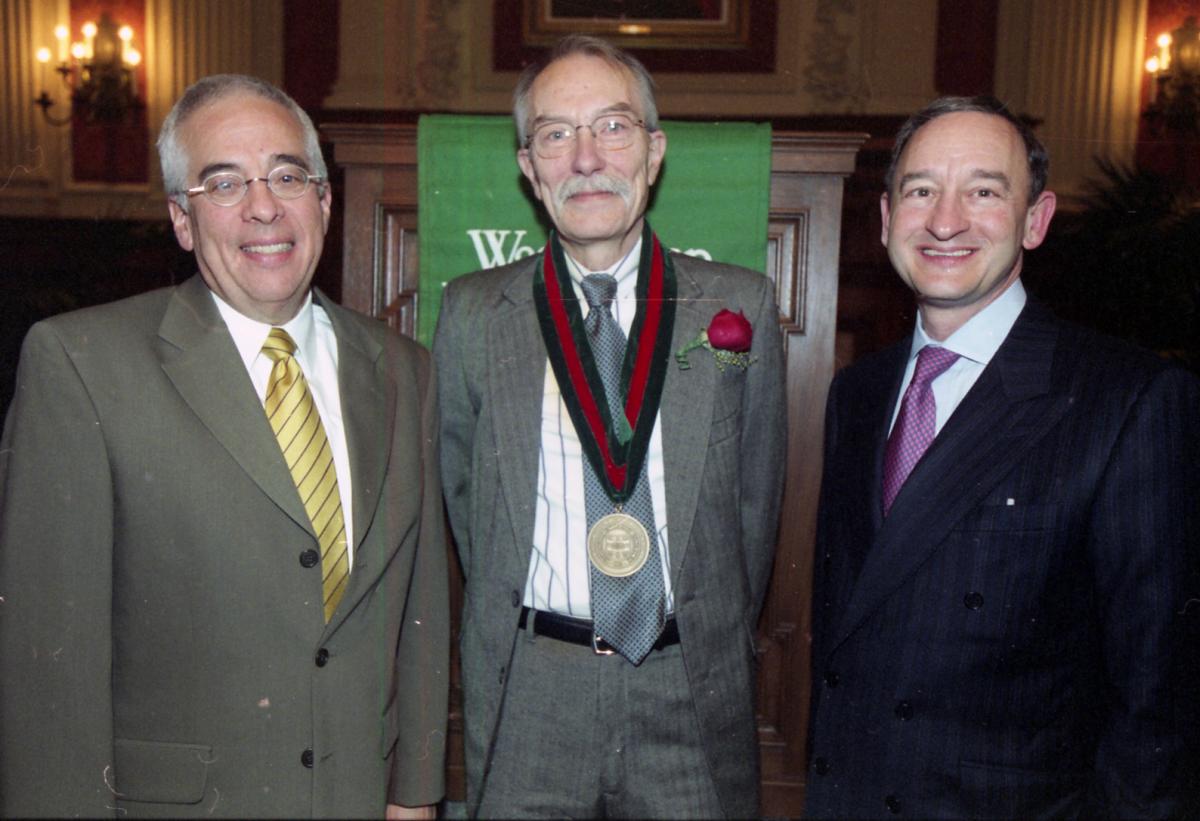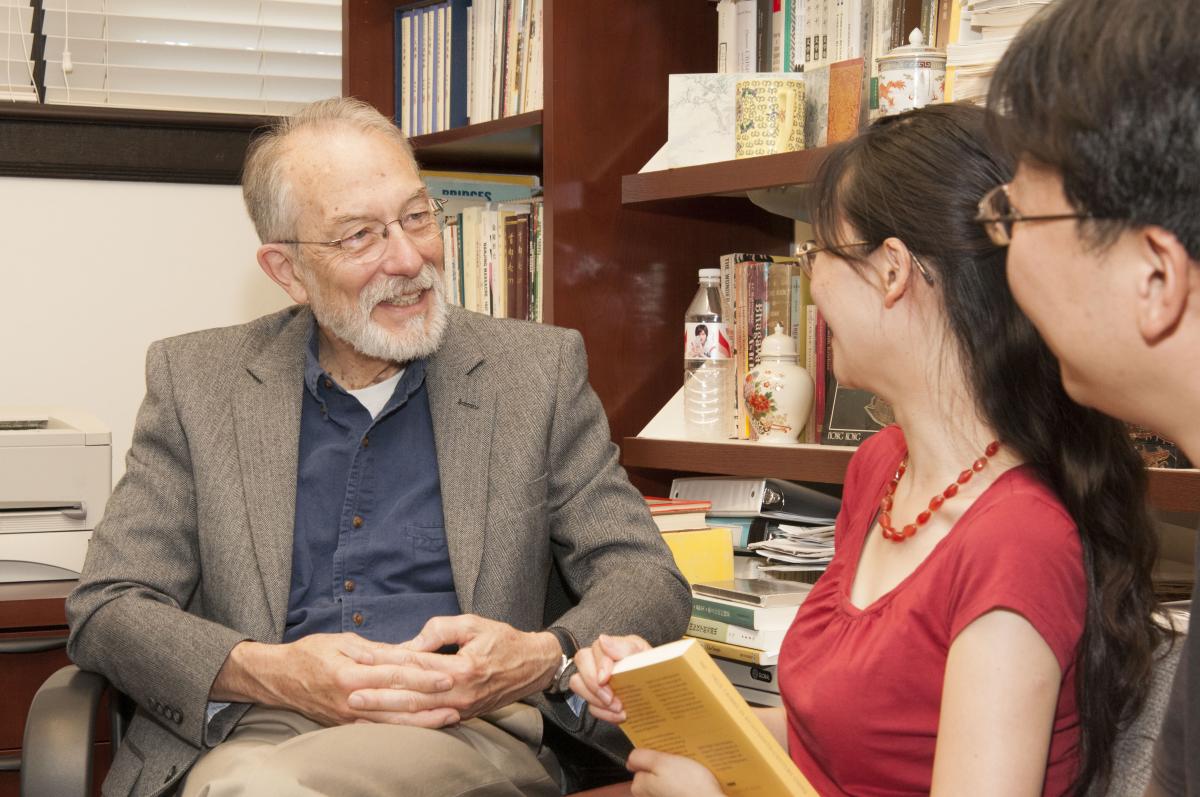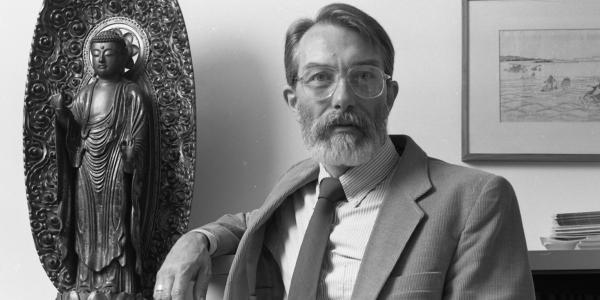Robert E. Hegel, professor of Chinese language and literature and the Liselotte Dieckmann Professor of Comparative Literature, retires at the end of this semester. We sat down with Hegel to talk about his love of Chinese literature, watching students become colleagues, and the joy of sharing the stories you love with students.
How did you first become interested in Chinese literature?
By accident and out of pure ignorance. My older brother was in the Air Force during the Korean War; we grew up on a dairy farm. He was stationed in Japan, and it happened that one of the cleaning staff was the son of a dairy farmer near Tokyo. So my brother visited them and got to know the family. He was really impressed by how well they cared for their cattle. So that got me excited about learning about Japan. Later, when I went off to college, it was during the Sputnik era and I was determined to become a rocket scientist. In my first year I took calculus, but I never understood a bit of it. I could do the manipulation of numbers and symbols only if it were a problem like the ones explained in class. After getting the lowest B- in a class of 250, I knew that I might well fail the next course in the sequence. I was confronted with what to do next. I had enjoyed studying Spanish and German in high school, so I thought I’d try another language—maybe Japanese. Japanese wasn't offered, but Chinese was. I found out very quickly that they are unrelated languages and distinctly different cultures. However, at that time US citizens could apply for National Defense Foreign Language Fellowships for four years of graduate study in critical languages. That program opened a door for me.

What led you to work on the early Chinese novel?
I set out to study modern Chinese literature after the BA. At that time there were only two graduate programs in the United States where modern Chinese literature was taught; coming out of the age of McCarthyism, the general assumption was that it was too political or too unrefined. Other US graduate programs in Chinese literature were all about classical poetry, thousand-year-old stuff, 800-year-old songs. I admired classical poetry, but much of it was written in highly refined language. Having started studying the Chinese language at the age of 19, I felt I was never going to be able read classical verse with any real command of the material. But stories I thought, well, stories are simple. Totally wrong again. As I said, I made a lot of choices out of pure ignorance — but with tremendous good luck. I grew up in a rural setting where everybody was telling stories all the time, to get their ideas across indirectly, to maintain family history, to fill the time. And so telling stories and how stories were told were really interesting to me.
I went to Columbia University to study modern Chinese literature from the professor who had just published the first lengthy book in English on the subject. C. T. Hsia was from Shanghai and had earned his PhD from Yale in English. I didn't really realize at that time, but he was teaching himself Chinese literature as he went along. But he was rabidly anti-communist and because of this, in his mind everything produced in China recently was trash propaganda, not worth serious study. But when he started writing a book on classical Chinese novels, he was reading these texts for the first time as an adult — maybe the first time ever — and he was really excited about them. I was inspired, and I thought, 'This will be my field.'
I try to open the door, and then they step through and come back and say, 'This is really great literature!'
How do you make 17th-century Chinese literature come alive for students?
You have to be enthusiastic about your material in any field. Also, I suppose it should be a dirty little secret but it is the case — I only teach things I like to read. I always have, because it's easy to be enthusiastic about one’s favorite texts. (I have a lot of favorite texts, which helps.) It's not really misleading the students at all to tell them, 'Look, this is really great literature and I'm going to show you why you should agree with me.' I try to open the door, and then they step through and come back and say, 'This really is great literature!' This is my joy in teaching.
It's not that hard to identify with the feelings of the great writers writing in Chinese. And that's one of its features that makes me so enthusiastic about Chinese literature. Chinese poets were writing in the generally same forms from about the second century up until last week. And that means that the form is really not of concern. They're short; they're regular in structure. But what poets fill them with is what matters. The idea is to read the poems with enough sympathy that you can identify with the poet’s feelings. And so almost by definition, a big percentage of Chinese poets write about universal human situations, not the sort of personal experience that no one else could fully understand. Much of premodern Chinese poetry is written with the assumption that if another person reads it 150 years or 800 years after I'm gone and can understand my feelings, then I am still alive. This is the only immortality we human beings can have. And I find that appealing.
What is your favorite text to teach?
That's a very hard question! Well if my Chinese students were here, they would say, oh surely you would say Honglou meng, a multi-volume novel from the 18th century known as Story of the Stone in English. It's really wonderful in that it is a complicated roman à clef of a young man in a fabulously wealthy family. It’s based loosely on the real experience of the novelist’s family, who were probably the richest family in China: they supplied woven brocades directly to the imperial household for the emperor’s use and for him to give away as presents to foreign dignitaries. Then the emperor died, and his successor was jealous of their status and so this new emperor broke the family. He confiscated all their property, leaving them penniless. But I'm not sure that's my favorite story. It's a great story, and it's the sort of book that if you read it without breaking down in tears it's because you haven’t been reading carefully. It's really a masterpiece of work, but it ends badly for everybody. That's sort of the way life is!

What I like best, though, are some essays written between 1080 and 1084. Their author, Su Shi was a brilliant author who was an outspoken politician who got himself into deep trouble and was sentenced to death. Through the intercession of friends in high places, he was exiled instead. Having had this close brush with death, he wrote these essays about the passage of time and the meaning of life and art. The essays take the form of diary entries on boating excursion the took on the Yangtze River, one in August and one in November of 1081. Of course, in August the moon is low; it's the Harvest Moon — big, orange, and bright. He and his friends get happily drunk and fall asleep in the boat, and it's all great fun — after quoting, paraphrasing, and referring to probably a dozen different poets, each one of them with a melancholy connotation — but all sad notes are philosophized away as they drink and have a good time. And then he comes back again in November and the river doesn't look the same. The place has changed; the level of the Yangtze river is significantly lower in the fall. Where they had smooth sailing before, now there are dangerous rocks. The moon is tiny, high in the sky, and they don't have any wine. Happily, the poet's wife finds some that she had put away for just such “emergencies.” Su and his friends go out and get drunk. After scrambling up a cliff, the poet tries to do a meditation technique, and it fails. That scares the hell out of him for reasons that are not explicit in the piece; you have to go over and over the essay to figure out what terrified this man. One factor was the likelihood he was never going to be allowed to leave this place. And he ends with a failed hope for some sort of positive sign. So these two essays are my favorite: they make me think, and to reread out loud to enjoy the language and to ponder what this says about the human condition. Students are often stunned by the depth of these essays.
What's it like seeing your graduate students develop into colleagues?
For a while I was keeping all of my students' books on one shelf. I don’t have a shelf that is long enough anymore. One of my first now is a full professor at University of California, Irvine, and has four monographs and two edited books to his credit; one of my former students who teaches in Hong Kong has produced five books. One who recently retired from Singapore, the son of a well-known essayist of the 1950s, has written six or seven books. It's a very large number of books altogether, to say nothing of hundreds of articles. I’ve learned so much more from them than I could ever have taught them. My job, then and still, is to stay out of their way and to cheer them on. It’s been tremendously rewarding!
Don't ever think you've learned enough. From now on you're your own teacher; you’ll have to find the right answers for yourself — and they're not available online.
Do you have any words of wisdom for graduating seniors?
Don't ever think you've learned enough. From now on you're your own teacher; you’ll have to find the right answers for yourself — and they're not available online.
Do you have anything you would like to say to your colleagues?
I have had a wonderful time at Washington University. I've learned more through teaching than I ever thought possible. I’ve enjoyed getting great questions from undergraduates that have made me rethink what I thought I knew — while having to work hard to keep ahead of the graduate students so that I know where to direct them. I found teaching here tremendously exciting. I was also fortunate to be hired here at a time when the department was ready to move in new directions and none of my colleagues really wanted to take the lead. Again without realizing what I was getting myself into, I volunteered to become departmental chair as a relatively new associate professor. And it was great: I’ve had the chance to shape new departments and then to stand back and watch programs grow and develop. Administration on the departmental level was an enlightening complement to teaching — always frustrating, but always rewarding.

Reflections from Hegel's colleagues in East Asian languages and cultures
Lingchei Letty Chen, associate professor of modern Chinese language and literature:
"Since I came to WU in 2000, Bob has been a steady support and wise mentor to me. He is always patient, encouraging, and generous with his time. Bob's scholarly impact on the studies of premodern Chinese narratives and theater is unparalleled, particularly in the Ming-Qing periods."
Beata Grant, professor of Chinese and religious studies:
"Bob Hegel’s impact over the course of his career has been quite considerable. In terms of the field, the titles of his many scholarly books, articles and annotated translations will for a very long time continue to be found on any list of essential readings on premodern Chinese narrative and drama. However, perhaps his most profound impact has been on the many students, both undergraduate and graduate, that he has taught and mentored over the years. In particular, his dedication to the intellectual growth (and emotional well-being) of his graduate students has been unstintingly generous and kind. They will always remember him as a model of what it means to be a scholar and a teacher in the humanities, as will I. I can only reiterate how deeply grateful I am for having had him as a close colleague for so many years. I am not sure I would have made it without his ongoing support and friendship!"
Rebecca Copeland, professor of Japanese language and literature and department chair:
"Bob Hegel has been foundational to the study of Chinese literature nationally and internationally. Closer to home, he has had a tremendous influence on the development of Asian Studies at Washington University. He was the chair when I was hired, and I have always turned to him as a model of leadership. In Japanese we describe someone who has such importance as a daikoku-bashira, or main pillar. In traditional Japanese architecture, the daikoku-bashira is placed at the center of a house and supports the weight of the entire structure. Bob Hegel has been the central pillar in our department — during our years as Asian and Near Eastern Languages and Literatures and later when we remodeled our “house” into East Asian Languages and Cultures. It will be difficult to imagine a house without its daikoku-bashira."




